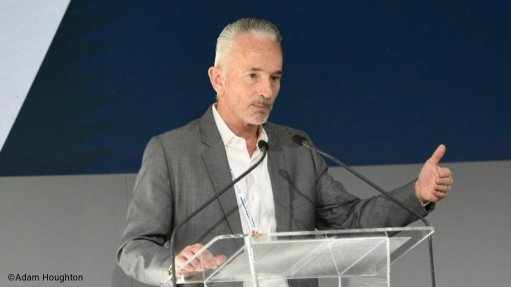
PCC executive director Dr Crispian Olver
Photo by: Adam Houghton
The Presidential Climate Commission (PCC) is currently assessing the impact of South Africa’s decision to delay the decommissioning of the Hendrina, Grootvlei and Camden coal-fired power stations on the country’s Nationally Determined Contribution (NDC), which outlines the country’s decarbonisation goals.
Eskom confirmed recently that Cabinet and board permission had been granted for the continued operation of the three power stations beyond their original decommissioning dates, owing to the ongoing shortage of supply and delays in adding new generation.
Under the original plan, the power stations were scheduled to be retired between 2023 and 2027, following Komati’s retirement in October 2022.
PCC executive director Dr Crispian Olver told delegates to a sustainable finance gathering in Sandton, co-hosted by the International Finance Corporation and the Banking Association South Africa, that the initial indications were that the delayed decommissioning would not result in an NDC breach, but that meeting the target in 2030 could be a “bit of a push”.
However, he did not provide details, saying only that a report would be published soon.
Ahead of COP26 in Glasgow in 2021, South Africa lodged an NDC outlining its goal of reducing carbon dioxide-equivalent (CO2-eq) emissions to between 420-million and 350- million CO2-eq tons in 2030.
It subsequently entered into a Just Energy Transition Partnership with France, Germany, the UK, the US and the European Union, under which $8.5-billion in concessional and grant finance was pledged in support of South Africa’s Just Energy Transition Investment Plan (JET-IP).
The plan, the slow implementation of which has been criticised, outlines the $100-billion in investment needed in electricity, electric vehicles and green hydrogen by 2030 to meet the lower end of the NDC range.
Pledges to the JET-IP have since increased to $11.5-billion, with the Netherlands, Denmark, Canada, Spain and Switzerland also making commitments.
“As the climate commission, we are looking long and hard at what [the delayed decommissioning] means in terms of our NDC commitments . . . [and] we will be putting a report out in the next month or so,” Olver said.
He added that it was “impossible” for South Africa to retire coal capacity “in the middle of a power crisis”.
In addition, having studied the decommissioning of Komati, the PCC felt that the schedule for the subsequent retirements would have to have been delayed regardless of whether Eskom and government were to complete the consultations and planning required to cushion affected workers and communities.
“We think that sequencing around Komati was completely back to front: they took a decision to decommission, then they started some half-hearted consultation, and then they did the economic diversification.
“We want to reverse that; so we want to start with consultations, then do the repurposing and diversification and only then pull the power plants off.
“That in itself is already going to push decommissioning deadlines up by four or five years.
“So, for us, this decision [to delay decommissioning] is not the make or break, it’s not going to collapse our climate commitments as a country,” Olver argued.
He also urged the finance community to acknowledge the “major reforms” under way in parallel, which were already having an impact on the real economy and which would require public and private funding support to be advanced and sustained.
These changes were listed as the accelerated investment in private renewables generation that had followed a reforms exempting distributed projects of any size from licensing, including those that were connected to the grid.
Besides the more than 1 400 projects that had been registered since the reform, with a combined capacity of more than 7 100 MW, Olver highlighted that there was also a pipeline of projects with a combined capacity of 22.5 GW at various stages of development. There was also a 10 GW pipeline of renewables, gas-to-power and battery storage projects scheduled to be procured as part of public programmes operated by government.
He also highlighted strong imports of solar panels and batteries over the past two years, underpinned largely by businesses and households that had invested in rooftop solar and storage capacity to mitigate loadshedding.
On the legislative front, the Electricity Regulation Amendment and the Climate Change Bills had been sent to the President for his signature, with the former passed with the aim of facilitating the introduction of a competitive wholesale electricity market.
Olver acknowledged that renewables- enabling grid investment had lagged, but said the new curtailment framework had unlocked about 3.4 GW of connection capacity for wind and that there were strong indications that South Africa would move to integrate independent transmission projects to support the unbundled National Transmission Company South Africa, which would be operationalised in July, to accelerate grid deployments.
“All of this is going to take considerable investment . . . and we estimate that we need about $100-billion by 2030 in the three JET-IP sectors alone.
“And we are probably going to need the equivalent amount of investment into climate resilience and into just transition measures as well.”
Olver said it was, thus, vital for private finance to be upscaled in parallel with the international development finance already pledged and any public finance that could be released without placing additional strains on the fiscus.
He also urged private financiers to increase their “appetite for risk”, questioning why banks continue to expect State guarantees before funding independent power producers participating in public bidding rounds.
“We’ve got to wean ourselves off that.
“If we’re going to make the entire transmission roll-out contingent upon the same sort of vanilla State guarantee mechanism, we are never going to be able to afford it as a country, and we are never going to get out of the starting blocks.”